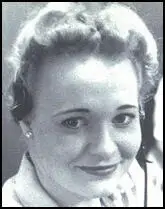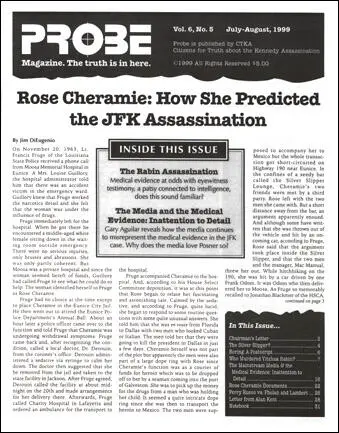Rose Cheramie

Rose Cheramie (Cherami) was found unconsciousness by the side of the road at Eunice, Louisiana, on 20th November, 1963. Lieutenant Francis Frugé of the Louisiana State Police took her to the state hospital. On the journey Cheramie said that she had been thrown out of a car by two gangsters who worked for Jack Ruby. She claimed that the men were involved in a plot to kill John F. Kennedy. Cheramie added that Kennedy would be killed in Dallas within a few days. Later she told the same story to doctors and nurses who treated her. As she appeared to be under the influence of drugs her story was ignored.
Following the assassination, Cheramie was interviewed by the police. She claimed that Lee Harvey Oswald had visited Ruby's night club. In fact, she believed the two men were having a homosexual relationship. Upon arrival in Houston she repeated this claim to Captain Morgan but refused to talk to federal authorities saying she's didn't want to get involved in this mess. According to Lt. Fruge, the information Rose Cherami supplied about the narcotics ring was "true and good information."
Rose Cheramie was found dead on 4th September, 1965. At first it appeared she had been involved in a road accident. Later it was argued that she had been shot in the head before being run over by by a car in order to disguise the original wound. However, the Louisiana State Police Memo reported: "Cheramie died of injuries received from an automobile accident on a strip of highway near Big Sandy, Texas, in the early morning of September 4, 1965. The driver stated Cheramie had been lying in the roadway and although he attempted to avoid hitting her, he ran over the top of her skull, causing fatal injuries. An investigation into the accident and the possibility of a relationship between the victim and the driver produced no evidence of foul play. The case was closed."

Primary Sources
(1) Michael Kurtz, Crime of the Century: The Kennedy Assassination From a Historians Perspective (1982)
During the middle of the night of 20 November 1963, Lieutenant Francis Fruge of the Louisiana state police drove a woman to a hospital near Eunice, Louisiana. Since the lady, Rose Cheramie, was a known narcotics addict, Fruge paid little attention to her rambling, half incoherent tale. Cheramie claimed that she and two male companions were making a "drug run" from Louisiana to Houston, Texas. During the automobile ride, they discussed the imminence of an assassination attempt against President Kennedy in Dallas on Friday, 22 November. After Cheramie got high on drugs, the men threw her out of the car. Lieutenant Fruge thought nothing of Rose Cheramie's story, nor did the physician to whom she repeated it. After learning of the Dallas murder, however, Fruge called the Dallas police and informed them of Cheramie's tale, but the Texas authorities were uninterested.
(2) Gary Richard Schoener, Fair Play Magazine, A Legacy of Fear (May, 2000)
On November 20, 1963 Rose Cherami (born Melba Christine Marcades) was thrown from a vehicle on highway 190 near Eunice, Louisiana. She was taken to the local hospital and then to jail, but moved to the East Louisiana State Hospital in Jackson when it appeared that she was having narcotic withdrawal. She told Dr. Victor J. Weiss Jr., a psychiatrist, that the President and other public officials were going to be killed on their visit to Dallas. After the President and Texas Governor John Connally were shot in Dallas on November 22, Dr. Weiss told at least one friend, Mr. A H. Magruder about the incident.
Rose Cherami, who had a long-criminal record and 19 known aliases, told Lt. Francis Fruge of the Louisiana State Police that she had been part of a narcotics ring working between Louisiana and Houston. On November 26, four days after the assassination, she was released from the hospital in the custody of Lt. Fruge and Capt. Ben Morgan of the Louisiana State Police plus Anne Diechler of the Revenue Division. They flew to Houston to investigate the narcotics ring and on the flight Rose allegedly picked up a newspaper which had a story about Jack Ruby's murder of Lee Harvey Oswald in which Ruby was quoted as denying he had ever known Oswald. According to Lt. Fruge Rose laughed and stated that Ruby and Oswald were very good friends, had been in Ruby's club together, and were even "bed partners." Upon arrival in Houston she repeated this claim to Capt. Morgan but refused to talk to federal authorities saying she's didn't want to get involved in this mess. According to Lt. Fruge, the information Rose Cherami supplied about the narcotics ring was "true and good information."
When an investigator working for New Orleans District Attorney Jim Garrison attempted to locate Rose Cherami in early 1967, he learned that she had been killed on Sept. 4, 1965, when a car ran over part of her head near Big Sandy, Texas. The driver of the car, who reported the accident to the Texas Highway Patrol after taking Rose to the hospital, claimed that the accident had been unavoidable because the victim had been lying on the roadway with her head and the upper part of her body resting on the traffic lane. Due to the unusual circumstances and the lack of prominent physical evidence, Officer J. A. Andrews attempted to determine whether the driver and Rose had any relationship. He found no evidence of such and although he was allegedly not completely satisfied that he had all the facts, he closed the case since the victim's relatives did not pursue the matter. Left unanswered were how Rose Cherami ended up lying on the highway, especially Texas highway 155, a "farm to market road." Had she been hitchhiking at 2 AM when the accident occurred, one would have expected her to have been on either of the two larger U. S. highways, 80 and 271, which parallel Texas highway 155. And, last but not least, was Rose Cherami's alleged prediction a lucky guess and were her statements about the Ruby-Oswald connection fabrications, or did she really know something of importance?

